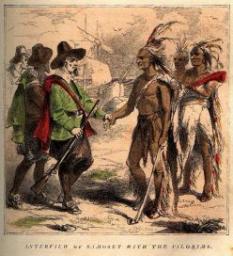Spring is Coming
It was early spring and the settler family had a hard time all winter. They had brought food with them. But it was mostly gone. They had hunted, but they were not good hunters. They knew how to farm. They did not know how to follow animal tracks. So they never got any rabbits when they hunted. Still, they had set traps and caught some rabbits. They had some potatoes they had gotten at the trading post. But they were tired of potatoes.
It was March and the weather was cool. The snow had melted, so they left to look for food. They looked for animal tracks and saw rabbit tracks in the mud. It was slippery, but they rushed after them. But they did not find any rabbits. They just got muddy.
Then they saw a Native American family. They had bows and arrows. They had big sticks. The family was worried. What would they say? What would they do?
The two families did not speak the same language. They could not talk with each other. But they waved and they smiled. They were not so worried. “They are using the bow and arrow to hunt,” said the mother. “They are looking for food, just like us."
The Native American family pointed and the settler family looked where they had pointed. There were green plants. There might be something to eat.
“It’s food!” the mother shouted. They rushed to where it was. It was onions and they were growing wild.
The family picked the onions and brushed off the dirt. They ate them. It was great to have fresh food.
“Let’s go home and look for my seeds,” the mother said. “It is going to be time to plant soon. We will have food. It is going to be a good spring. We should give some of our seeds to our new friends.”
